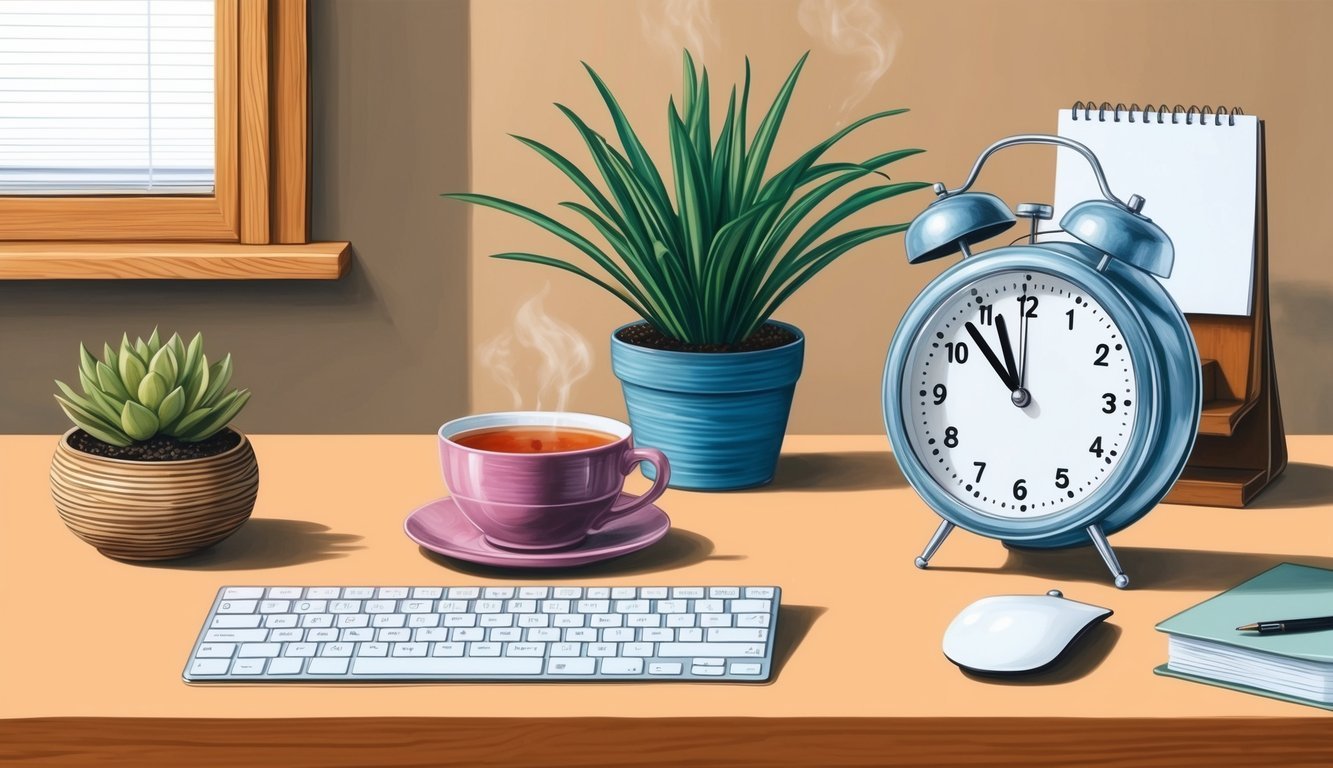I know how challenging it can be to battle fatigue throughout the day.
It’s that heavy feeling that can creep in even during the most engaging activities.
Finding simple ways to boost my energy and stay alert can make a huge difference in how I feel and what I accomplish.

In my experience, a few quick adjustments can help shift my energy levels and tackle tiredness.
Whether it’s through small lifestyle changes or practical tips, I’ve learned that incorporating these strategies can really improve my daily routine.
This article will explore some easy ways to help reduce fatigue and keep me feeling energized.
1) Stay hydrated with plenty of water
Staying hydrated is one of the easiest ways I can combat fatigue.
When I don’t drink enough water, I often feel sluggish and unfocused.
I make it a point to keep a water bottle nearby.
This helps me sip throughout the day instead of waiting until I’m thirsty.
I’ve learned that thirst can be a sign I’m already a bit dehydrated.
Sometimes, I spice things up by adding slices of lemon or cucumber to my water.
This makes it more enjoyable and encourages me to drink more.
I also try to drink a glass of water first thing in the morning.
It wakes me up and sets a positive tone for the day.
During meals, I drink water as well.
This not only helps with hydration but can aid in digestion too.
If I ever feel fatigued in the afternoon, I check my water intake for the day.
It’s surprising how a simple refill can boost my energy levels.
Staying hydrated is truly key to feeling my best.
Take short, frequent breaks

I’ve found that taking short, frequent breaks really helps reduce fatigue.
Research shows that even brief pauses during work can enhance my focus and overall well-being.
I like to set a timer for about 25 to 30 minutes of work followed by a 5-minute break.
During these breaks, I step away from my desk, stretch, or grab a quick snack.
It’s interesting to note that a few minutes of physical activity can boost memory and attention.
I often do some quick exercises like pushups or a brisk walk, which refreshes my mind and body.
Taking breaks in the morning seems to be more effective too.
I noticed that I feel more energized throughout the day when I prioritize those early pauses.
I’ve also found that these early pauses help me stay focused and productive for longer periods.
Instead of struggling through a midday crash, I can rely less on afternoon slump hacks to regain my energy.
Starting the day with short breaks makes a noticeable difference in how I manage my workload.
Incorporating micro breaks into my routine not only lifts my mood but also helps prevent burnout.
These small adjustments can make a big difference in how I feel as the day goes on.
3) Incorporate a short nap
I find that a short nap can be a game changer when I’m feeling fatigued.
Napping for about 20 to 30 minutes is often enough to recharge my energy levels.
This quick rest period helps me feel more alert and focused afterward.
When I want to nap effectively, I choose a quiet, comfortable spot.
Setting an alarm is key for me, ensuring I don’t oversleep.
I usually plan for a little extra time to drift off, like setting my alarm for 31 minutes when I want a 26-minute nap.
Using earplugs or a sound machine really helps me block out noise.
I also close the curtains or wear an eye mask to keep the light at bay.
This makes it much easier for me to fall asleep quickly.
Short naps have been linked to improved mood and increased productivity.
I often notice my performance spikes after a nap, whether I’m working on a project or tackling daily tasks.
It’s a simple way to combat afternoon slumps without turning to caffeine.
4) Stretch regularly to boost energy
I find that stretching can be a game changer for my energy levels throughout the day.
Just a few minutes of simple desk stretches can really help to perk me up.
When I take breaks to stretch, I notice that my muscles relax, and I feel more alert.
Even incorporating a quick yoga routine can enhance my confidence and boost my mood.
If I’m sitting for long periods, I make it a point to stand up and stretch my legs every hour.
This movement helps get my blood flowing, which can elevate my energy.
I like to try stretches like Upward Dog or simple neck rolls.
These not only relieve tension but also refresh my mind.
Regular stretching has definitely become a key part of my day-to-day routine for fighting fatigue.
5) Limit caffeine intake after noon

I’ve found that cutting off caffeine after noon really helps reduce fatigue later in the day.
Caffeine can stay in your system for hours.
If I drink coffee too late, I notice it affects my sleep quality.
The U.S. Food and Drug Administration recommends limiting caffeine to about 400 milligrams daily.
That’s roughly four 8-ounce cups of coffee, which is more than enough for most people.
Timing matters, though.
Setting a personal cutoff time, like 2 p.m., works for me.
This gives my body a chance to calm down before bedtime.
I’ve noticed that my focus improves when I don’t rely on caffeine late in the day.
If I’m feeling sluggish in the afternoon, I’ll opt for a glass of water or herbal tea instead.
Staying hydrated helps keep my energy levels stable without the jitters that can come from caffeine.
6) Opt for a light, balanced lunch

Choosing a light, balanced lunch is key to keeping my energy levels up throughout the day.
Heavy meals can lead to that sluggish feeling, making it hard to concentrate.
I like to include fiber and protein in my lunch choices.
Plates with items like black bean salad or Caprese avocado toast help me feel satisfied without being weighed down.
When I’m busy, I grab wraps or salads with lean proteins and plenty of veggies.
They’re quick to prepare, and I can easily pack them for work or school.
Snacking on nuts and seeds is another great way to boost my energy.
They’re nutritious and easy to carry, making them a perfect pick-me-up between meals.
Staying hydrated is also important; I try to drink water alongside my lunch to maintain my focus and reduce fatigue.
7) Practice deep breathing exercises

I find that practicing deep breathing exercises can really help reduce fatigue throughout the day.
When I take a moment to breathe deeply, I feel more focused and energized.
One technique I like is the 4-7-8 breathing method.
I inhale for 4 seconds, hold my breath for 7 seconds, and then exhale for 8 seconds.
This helps calm my mind and body.
Another effective method is equal breathing.
I inhale and exhale for the same count, usually 4 or 5 seconds.
This simple pattern helps balance my energy levels.
I often do these exercises while sitting comfortably or even lying down.
It’s a quick reset that I can fit into my day, whether I’m at my desk or taking a break.
I also enjoy pairing deep breathing with visualization.
I picture a calming scene as I breathe, which enhances the relaxation effect.
It’s amazing how a few minutes of focused breathing can shift my energy and mood.
Understanding Fatigue

Fatigue can feel overwhelming at times, affecting my daily activities and overall well-being.
It’s essential to recognize what causes these feelings and the signs to look out for.
What Causes Fatigue?
Fatigue can be triggered by various factors, including inadequate sleep, stress, and poor nutrition.
Here are some key causes:
- Sleep deprivation: Not getting enough quality sleep leaves me drained.
- Stress and anxiety: Continual mental strain takes a toll on my energy levels.
- Poor diet: Eating processed or high-sugar foods can create energy spikes followed by crashes.
- Lack of physical activity: Ironically, being inactive can lead to more fatigue.
Understanding these factors helps me make better choices to combat fatigue.
For instance, I can adjust my sleep schedule or improve my diet to enhance my energy levels.
Signs of Everyday Fatigue
Recognizing the signs of fatigue is crucial for managing it effectively.
I typically notice symptoms such as:
- Constant tiredness: Even after a full night’s sleep.
- Irritability: Small things frustrate me more than usual.
- Difficulty concentrating: This makes it hard to focus on tasks.
- Reduced motivation: I might not feel like engaging in activities I usually enjoy.
These indicators can signal that it’s time to reassess my lifestyle.
By paying attention to how I feel, I can take steps to reduce my fatigue.
Lifestyle Adjustments

Making intentional lifestyle adjustments can significantly impact energy levels throughout the day.
By focusing on what I eat and incorporating regular exercise into my routine, I can effectively combat feelings of fatigue.
The Role of Diet in Energy Levels
I’ve noticed that my diet plays a crucial role in how energized I feel.
Consuming a balanced diet rich in whole foods can provide a steady release of energy.
Here are some key foods to consider:
- Complex Carbohydrates: Foods like whole grains, legumes, and fruits are great for sustained energy.
- Lean Proteins: Incorporating chicken, fish, beans, and nuts helps in muscle repair and energy maintenance.
- Healthy Fats: Avocados, olive oil, and fatty fish are essential for brain health and stamina.
I also pay attention to hydration.
Drinking plenty of water throughout the day helps prevent sluggishness.
Additionally, I avoid heavy, processed foods that can lead to energy crashes.
Importance of Regular Exercise
Integrating regular exercise into my routine has transformed how I manage fatigue.
Even short bursts of activity can boost my energy levels.
Here’s how I approach it:
- Consistency is Key: I aim for at least 150 minutes of moderate exercise per week. I can break this down into shorter sessions like 30-minute walks.
- Mix It Up: I keep things interesting by alternating between cardio, strength training, and flexibility exercises. This variety keeps me engaged and motivated.
- Mindful Movement: Activities like yoga and stretching not only enhance physical fitness but also improve my mental clarity and reduce stress.

